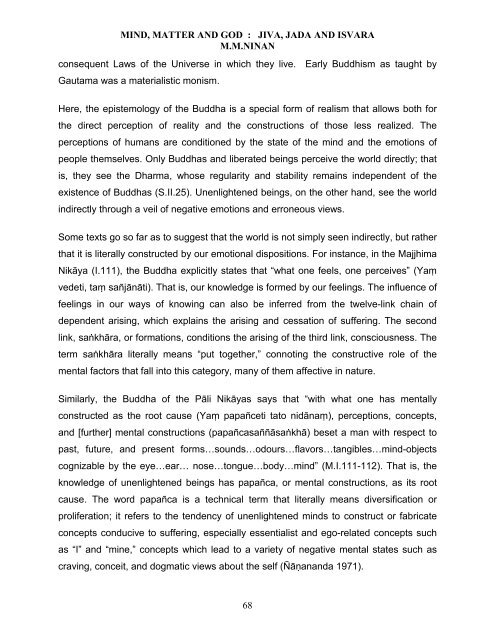Jiva
You also want an ePaper? Increase the reach of your titles
YUMPU automatically turns print PDFs into web optimized ePapers that Google loves.
MIND, MATTER AND GOD : JIVA, JADA AND ISVARA<br />
M.M.NINAN<br />
consequent Laws of the Universe in which they live. Early Buddhism as taught by<br />
Gautama was a materialistic monism.<br />
Here, the epistemology of the Buddha is a special form of realism that allows both for<br />
the direct perception of reality and the constructions of those less realized. The<br />
perceptions of humans are conditioned by the state of the mind and the emotions of<br />
people themselves. Only Buddhas and liberated beings perceive the world directly; that<br />
is, they see the Dharma, whose regularity and stability remains independent of the<br />
existence of Buddhas (S.II.25). Unenlightened beings, on the other hand, see the world<br />
indirectly through a veil of negative emotions and erroneous views.<br />
Some texts go so far as to suggest that the world is not simply seen indirectly, but rather<br />
that it is literally constructed by our emotional dispositions. For instance, in the Majjhima<br />
Nikāya (I.111), the Buddha explicitly states that “what one feels, one perceives” (Yaṃ<br />
vedeti, taṃ sañjānāti). That is, our knowledge is formed by our feelings. The influence of<br />
feelings in our ways of knowing can also be inferred from the twelve-link chain of<br />
dependent arising, which explains the arising and cessation of suffering. The second<br />
link, saṅkhāra, or formations, conditions the arising of the third link, consciousness. The<br />
term saṅkhāra literally means “put together,” connoting the constructive role of the<br />
mental factors that fall into this category, many of them affective in nature.<br />
Similarly, the Buddha of the Pāli Nikāyas says that “with what one has mentally<br />
constructed as the root cause (Yaṃ papañceti tato nidānaṃ), perceptions, concepts,<br />
and [further] mental constructions (papañcasaññāsaṅkhā) beset a man with respect to<br />
past, future, and present forms…sounds…odours…flavors…tangibles…mind-objects<br />
cognizable by the eye…ear… nose…tongue…body…mind” (M.I.111-112). That is, the<br />
knowledge of unenlightened beings has papañca, or mental constructions, as its root<br />
cause. The word papañca is a technical term that literally means diversification or<br />
proliferation; it refers to the tendency of unenlightened minds to construct or fabricate<br />
concepts conducive to suffering, especially essentialist and ego-related concepts such<br />
as “I” and “mine,” concepts which lead to a variety of negative mental states such as<br />
craving, conceit, and dogmatic views about the self (Ñāṇananda 1971).<br />
68


















